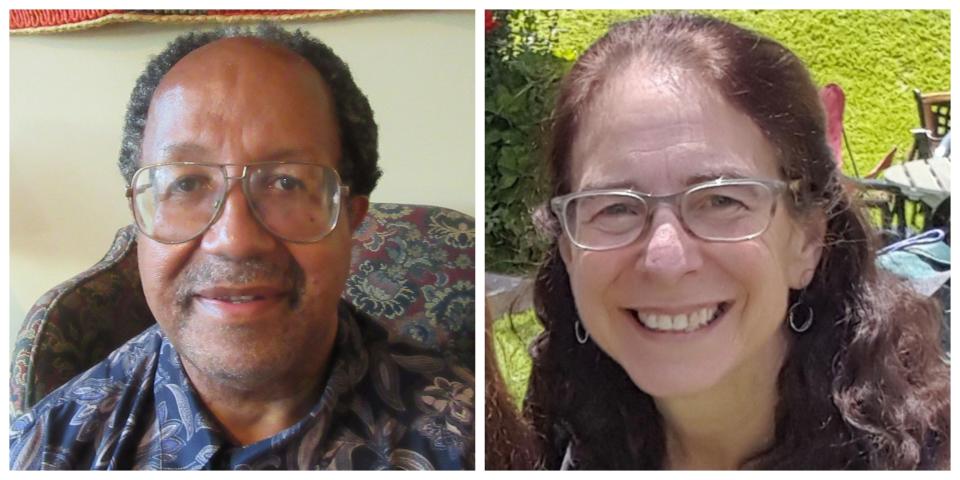Website reveals heart of Tuskegee-South Berwick Sister City project: Color Us Connected
This column appears every other week in Foster’s Daily Democrat and the Tuskegee News. This week, Guy Trammell, an African American man from Tuskegee, Ala., and Amy Miller, a white woman from South Berwick, Maine, write about the new website that tells the story of the Sister City relationship between their two communities.
By Amy Miller
We have created a website for our Tuskegee-South Berwick Sister City project. It is time, we decided, to tell the tale of this relationship that began in 2017 between a mostly white community in Maine and a mostly Black community in Alabama .
So we created this website to share what we are doing, how our two towns are trying to tackle the huge challenge of racial wrongs in our country. It took a year to build the website as our joint committee of 16 people from Maine and Alabama ironed out the details, but here it is: commongroundsistercities.org.

When we first talked about the website, we wondered who would look at the site and whether it would correctly depict our story – the story of how personal relationships can create understanding and eliminate fears, friendship by friendship, dialogue by dialogue.We called on web designer Nicole Purrington of Jefferson, NH to help us. She had never heard of the relationship between Tuskegee and South Berwick. But she sat through meeting after meeting and learned what we were up to as committee members debated how to best bring other people into our forward march.Nicole sifted through photos of us eating lobsters in Maine, singing holiday tunes in Tuskegee, visiting schools in both places and learning the history of each other's town. She listened as we endlessly debated the use of one word or another to describe our efforts, whether to capitalize “Black,” whether to speak of “understanding” or “growth” or “progress.” And through this she got to know what our relationship is about.
The website gives voice to how and why we formed a relationship. It gives a window into the super fun visits and difficult discussions.
It tells of our mission: “To cultivate an environment for citizens of two communities, one predominantly Black and the other predominantly White, to talk, listen and engage with each other to improve and sustain better race relations.”
And our vision: “To get to a place in our hearts and our lives where our racial differences are celebrated, and not feared.”As we were putting finishing touches on the site, we wondered what Nicole had taken away from working on it.
Her answer captured our ultimate aim.“In a time of persistent divisiveness on many fronts in our country,” she wrote, “it was refreshing and awe-inspiring to learn about how members of these two communities have invested themselves individually and collectively to address racial divisiveness.”
She is right. We are not going to solve, but at least we can “address” racial divisiveness.
We invite you to check out our website and join us in this walk toward a stronger country.
By Guy Trammell Jr.
Frederick Douglass primarily had one purpose in life, to move African Americans off the plantation. However, African Americans also needed to expand their thoughts and awareness from the confines of day-to-day survival within plantation life to the boundless opportunities on a global perspective.
That responsibility became the life’s work of Booker T. Washington. In his 1905 book, “Tuskegee & Its People: Their Ideals and Achievements,” he wrote this concerning the purpose of Tuskegee University: “The object of the school is to train men and women who will go out and repeat the work done here, to teach what they have learned to others.”
From Common Ground’s very beginning in 2017, we of a majority white community and a majority Black community were intentionally creating a space of purpose, communication, action and friendship that has only grown stronger and more determined over time.
We now have a website, which we encourage everyone to visit, glean useful nuggets, then go and create more common ground. Our website is to be a tool for improving our world. Those involved in this undertaking are amazing people, and I wish you could converse with each of them and hear their incredible perspectives. We are very much determined that we can spread the realization of a broader world, where together we accept each other as human.
Divisions are everywhere, but Common Ground has engaged our Sister Cities in honest discussions on racial issues. Talking about race with each other is not impossible, and it is not difficult. Schoolchildren in Maine and Alabama came together in virtual discussions on civil rights, and collectively created a cartoon character to promote racial harmony.
We studied the history of our communities together, and we’ve broken bread together, enjoying New England cuisine and Southern cuisine. Together we experienced a kayaking adventure down a Maine river and danced the night away aboard a riverboat on the Alabama River. Together, in visits to South Berwick and Tuskegee schools, we shared our individual life stories with the youth. And 200 adults - 100 from each community - shared their perspectives on elections (not politics!) in the video and book project, “Together We Vote.”
Common Ground has much more on the way, and our website can assist you in becoming engaged with us. Find out what we are up to, check out what you missed, and learn how to get involved!
The prolific scientist George Washington Carver, when asked why he made so many inventions and discoveries, said he was simply showing others they could do the same.
OK, your world needs someone to start the conversation! Could you be the one?
Amy and Guy can be reached at colorusconnected@gmail.com
This article originally appeared on Portsmouth Herald: Commentary: How towns in Maine and Alabama are tackling race

